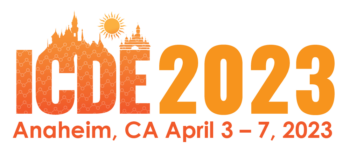Call for Papers for ICDE 2023 Special Track
We solicit position papers for a special track at ICDE 2023. The field of databases is rapidly growing simultaneously in several ways. New systems with new capabilities and new approaches to data management are being constantly developed. Database technologies and ideas are finding their way into new applications. The field of data science, of which data curation, wrangling, cleaning, etc. are key is exploding. Over the years, we as a community have adapted our conferences to accommodate and encourage such growth. For instance, the CIDR conference targets early papers that provide a forum to exchange radically new ideas. Conferences such as VLDB and SIGMOD have created special tracks to promote research in data science and to provide a forum to share experiences dealing with data analysis in diverse application settings. Our goal in ICDE 2023 is to bring a little of each of these ideas into ICDE to make a more exciting conference. We hope to create a few special sessions that achieve a combination of CIDR style early papers (we term them as vision papers), and papers that expand the use of databases, as well as highlight database research and practice in Data sciences.
To help create a truly exciting program, we have collected a panel of distinguished special track PC members that consist of senior members of our community (listed below). The special track submission offers an opportunity to share your vision of novel challenges faced by future data systems, novel use cases/applications of data management technologies in emerging areas. It also provides a unique opportunity to get feedback on your research from distinguished senior researchers in our community.
Papers of Interest for the Special Track:
We welcome submissions in the following categories. The categories listed below are not intended to be exhaustive. Papers that do not necessarily fall into one of these categories will also be considered.
- Vision Papers: Papers describing data management use cases/scenarios that push the limit of existing systems The papers should clearly articulate the importance of the use case, make an argument about limitations of existing technology, and lay out a direction of the future.
- Expanding the Landscape: Papers that highlight database technologies to be used in novel ways to solve problems in different domains (e.g., precision medicine using OLAP technology, data engineering for 3D scene construction and protein folding with data preparation techniques ).
- Database use in Data Science: real world deployment of data management technologies, data set curation, labeling, wrangling, compression, cleaning, system design, deployment, analytics. The use case will be evaluated based on novelty, lessons one can learn from it, etc. Papers dealing with experience teaching data science classes with projects where the way instructors organize projects and/or tools they may have developed which could be of broader interest encouraged.
- Novel Data Application: Novel applications about data, topics include but not limited to data pricing, data auction and data sharing, and data management issues in metaverse. Papers addressing any emerging novel data usage applications
Restrictions and Guidelines
Submission Length : 6-12 pages, double column, IEEE format. It is recommended that papers be closer to 6 pages than the maximum limit of 12.
Number of Submissions: Each person can co-author NO MORE than 2 submissions of which, he/she can be a lead author of at most one paper.
Submissions from Special Track PC: We encourage members of the special track PC to consider submitting papers as well. Since the special track PC list is small, to maintain anonymity of reviews further, for papers co-authored by special-track PC members, we may seek reviewers from regular PC as needed.
Submission Deadline :
Submission due: November 8th 2022
Notification to authors (Accept/Reject): Jan 30, 2023 (Monday)
Camera-ready copy due: February 28, 2023 (Tuesday)
Special Track PC
Alon Halevy, Recruit
Anastasia Ailamaki, EPFL
Divyakant Agrawal, UC Santa Barbara
Peter Buneman, The University of Edinburgh
Michael J Carey, University of California, Irvine
Surajit Chaudhuri, Microsoft
AnHai Doan, University of Wisconsin
Johannes Gehrke, Microsoft
Joseph Hellerstein, University of California, Berkeley
Chris Jermaine, Rice University
Masaru Kitsuregawa, University of Tokyo
Hank (Henry) Korth, Lehigh University
Arun Kumar, University of California, San Diego
C. Mohan, Tsinghua University
Beng-Chin Ooi, NUS
Tamer Ozsu, Waterloo
Raghu Ramakrishnan, Microsoft
Michael Stonebraker, MIT
Wang-Chiew Tan, Facebook AI
Jeffrey Ullman, Stanford University
Stan Zdonik, Brown University


